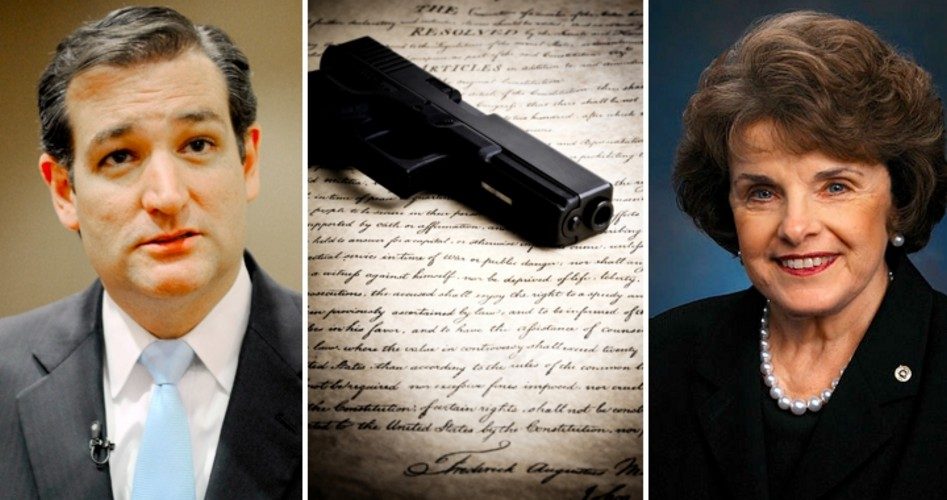
Senator Ted Cruz (R-Texas) posed a few questions for Senator Diane Feinstein (D-Calif.) on March 14, during a Senate Judiciary Committee hearing on her bill. Her measure would limit the number and types of arms that individual Americans may possess. The exchange between the two presented an opportunity for all to learn a lesson about the Constitution that the American people need to consider.
Senator Ted Cruz began the exchange with the following statement and questions:
The second amendment of the Bill of Rights provides that the right of the people to keep and bear arms shall not be infringed. The term “the right of the people,” for the framers who included it in the Bill of Rights used it as a term of law. That same phrase, “the right of the people” is found in the First Amendment: “the right of the people peaceably to assemble, and to petition the government for a redress of grievances.” It is also found in the Fourth Amendment: “the right of the people to be [free from] unreasonable searches and seizures.”
The question that I would pose to the senior senator from California is “Would she deem it consistent with the Bill of Rights for Congress to engage in the same endeavor that we are contemplating doing with the Second Amendment in the context of the First or Fourth Amendments, namely: Would she consider it constitutional for Congress to specify that the First Amendment shall apply only to the following books and shall not apply to the books that Congress has deemed outside the protection of the Bill of Rights?
Likewise, would she think that the Fourth Amendment protection against searches and seizures could properly apply only to the following specified individuals and not to the individuals that Congress has deemed outside the protection?
Senator Feinstein’s response began with insistence that she was not a “sixth grader” in need of “a lecture” about the Constitution. She added that she greatly respects and has studied the Constitution, has 20 years of service in Congress, and knows of many misuses of weapons such as what occurred in Sandy Hook, Connecticut. But she did not respond to the Texas senator’s questions. (See the video below.)
Given additional time, Senator Cruz addressed the committee’s chairman: “I would note that she chose not to answer the question that I asked … which is: In her judgment, would it be consistent with the Constitution for Congress to specify which books are permitted and which books are not?” Senator Feinstein finally answered, “No.” If the right of the people has to be protected regarding the books they read, it surely follows that the right of the people to be armed deserves equal protection. But this point was made only implicitly.
In further remarks, Ms. Feinstein stated, “Congress is in the business of making law and the Supreme Court interprets the law.” That, unfortunately, is only half correct. Yes, it is the business of Congress to make law. But, no, there is no authority in the Constitution that empowers the Supreme Court or any other court to “interpret” the Constitution. Instead, the courts should see to it that the Constitution is obeyed and adhered to, not according to any new and prevailing attitude but, as Thomas Jefferson stated, “[let us] carry ourselves back to the time when the Constitution was adopted, recollect the spirit manifested in the debates, and instead of trying what meaning may be squeezed out of the text, or invented against it, conform to the probable one in which it was passed.”
It was in Marbury v. Madison (1803) that Chief Justice John Marshall asserted, “It is emphatically the province and duty of the judicial branch to say what the law is.” From that time forward, the Supreme Court has assumed sole power to decide what a law says, even if its decision contradicts the law’s text. Not only that, the precedent set more than 200 years ago takes away any power of Congress to pronounce the meaning of a law and to insist on original intent. If the meaning of law can be changed by the court – or by anyone – why write it down?
Marshall also claimed that, in addition to the powers mentioned in the Constitution, the federal government could adopt powers “which are not prohibited” by the Constitution. (See McCulloch v. Maryland, 1819). That put a huge hole in the entire document, especially its Tenth Amendment. This is the hole that continues to be used by many, Feinstein included, to build federal power over the people.
Senator Cruz made a few excellent points during his brief appearance before the Judiciary Committee. Senator Feinstein, on the other hand, had to admit reluctantly that the rights of “the people” as expressed in the First, Second and Fourth Amendments does indeed block federal power. But expecting her to follow through on her grudging admission and cease her participation in the war on “the right of the people to keep and bear arms” is the equivalent of expecting tomorrow’s sunrise to come from the west.
Let us encourage other members of the Senate, and their counterparts in the House, to honor the rights of the people including the right to be armed.
The Constitution was created to give government very few powers. The Bill of Rights was added to emphasize that other powers not granted to the federal government cannot be assumed. A return to honoring these basic concepts could hardly be more important.
Graphic: Sen. Ted Cruz (AP Images); gun and the Constitution; Sen. Diane Feinstein
Cruz Sends Scarborough and Maddow of MSNBC Into Conniptions
Senate Judiciary Committee Passes Feinstein’s “Assault Weapons” Ban



